- Home »
- China Culture »
- Mid-Autumn Festival »
- Popular Poems
2 Popular Chinese Mid-Autumn Festival Poems
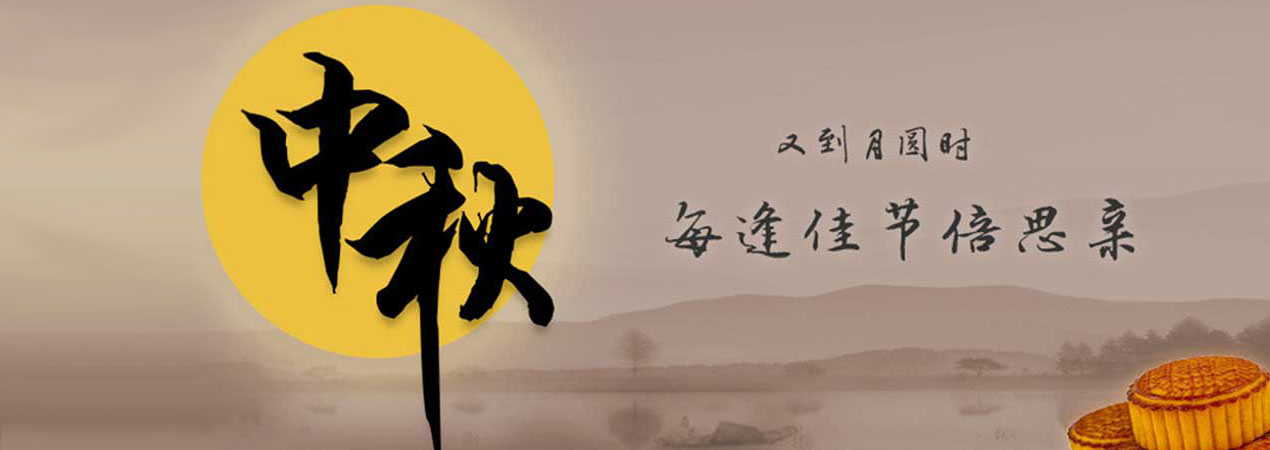
There are many poems about the moon in Chinese literary history. A lot of literary men expressed their joys and sorrows, their ups and downs, by poetic verse in depicting the moon. The following 2 poems are masterpieces in Chinese literature wrote by Li Bai and Sushi respectively.
shuǐ diào gē tóu
水 调 歌 头
The Mid-Autumn Festival Tune
sū shì
苏 轼
By Sushi
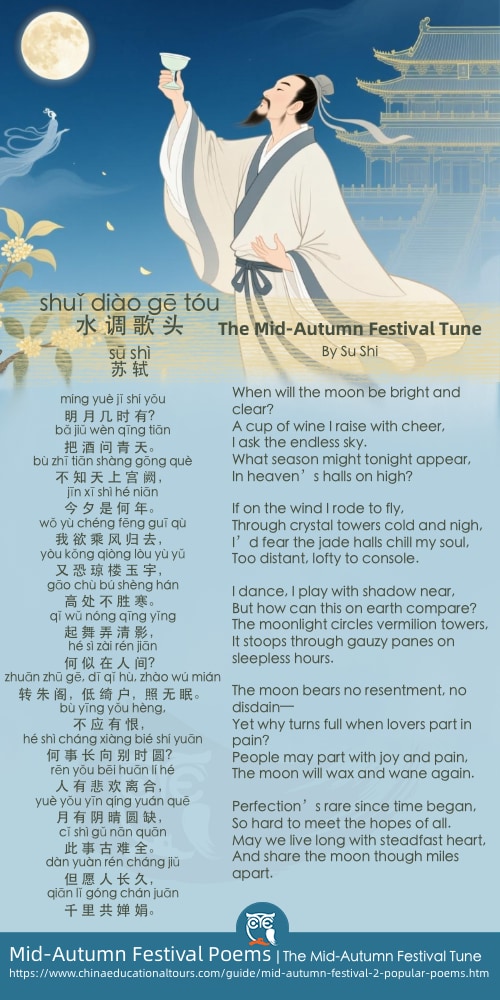
míng yuè jǐ shí yǒu bǎ jiǔ wèn qīng tiān
明 月 几 时 有?把 酒 问 青 天。
When will the moon be bright and clear?
A cup of wine I raise with cheer,
I ask the endless sky.
bù zhī tiān shàng gōng què, jīn xī shì hé niān
不 知 天 上 宫 阙,今 夕 是 何 年。
What season might tonight appear,
in heaven’s halls on high?
wǒ yù chéng fēng guī qù, yòu kǒng qiòng lòu yù yǔ, gāo chù bú shèng hán
我 欲 乘 风 归 去,又 恐 琼 楼 玉 宇, 高 处 不 胜 寒。
If on the wind I rode to fly,
through crystal towers cold and nigh,
I’d fear the jade halls chill my soul,
too distant, lofty to console.
qǐ wǔ nóng qīng yǐng, hé sì zài rén jiān
起 舞 弄 清 影,何 似 在 人 间?
I dance, I play with shadow near,
but how can this on earth compare?
zhuān zhū gē dī qǐ hù, zhào wú mián
转 朱 阁,低 绮 户,照 无 眠。
The moonlight circles vermilion towers,
it stoops through gauzy panes on sleepless hours.
bù yīng yǒu hèng, hé shì cháng xiàng bié shí yuān
不 应 有 恨,何 事 长 向 别 时 圆?
The moon bears no resentment, no disdain—
Yet why turns full when lovers part in pain?
People may part with joy and pain,
the moon will wax and wane again.
rēn yǒu bēi huān lí hé, yuè yǒu yīn qíng yuán quē, cǐ shì gǔ nān quān
人 有 悲 欢 离 合, 月 有 阴 晴 圆 缺,此 事 古 难 全。
Perfection’s rare since time began,
so hard to meet the hopes of all.
May we live long with steadfast heart,
and share the moon though miles apart.
dàn yuàn rén cháng jiǔ, qiān lǐ góng chán juān
但 愿 人 长 久,千 里 共 婵 娟。
May we live long and share the beauty of the moon together, even if we are hundreds of miles apart.
Good to know: Sushi was a famous poet in North Song (960-1127). In this poem, the emotions of sadness and pleasure combine with philosophical thinking reflecting the author’s feeling of complexity and contradiction, as well as passion of life and the optimistic view.
wàng yuè huái yuǎn
望月怀远
Gaze at the Moon and Pine for Far Ones
zhāng jiǔ líng
张 九 龄
By Zhang Jiuling
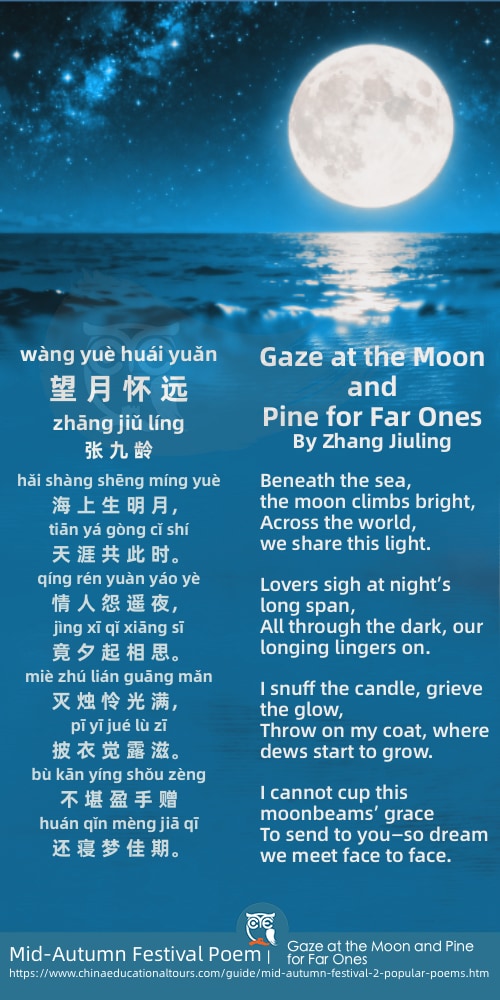
hǎi shàng shēng míng yuè,
海 上 生 明 月,
Beneath the sea, the moon climbs bright,
tiān yá gòng cǐ shí。
天 涯 共 此 时。
Across the world, we share this light.
qíng rén yuàn yáo yè,
情 人 怨 遥 夜,
Lovers sigh at night’s long span,
jìng xī qǐ xiāng sī。
竟 夕 起 相 思。
All through the dark, our longing lingers on.
miè zhú lián guāng mǎn,
灭 烛 怜 光 满,
I snuff the candle, grieve the glow,
pī yī jué lù zī。
披 衣 觉 露 滋。
Throw on my coat, where dews start to grow.
bù kān yíng shǒu zèng,
不 堪 盈 手 赠,
I cannot cup this moonbeams’ grace,
huán qǐn mèng jiā qī。
还 寝 梦 佳 期。
To send to you—so dream we meet face to face.
Good to know: This poem was written by Zhang Jiuling, a poet of the Tang Dynasty, in the 14th year of the Kaiyuan era, when he was exiled in Hongzhou. It happened to be the time of the Mid-Autumn Festival. The verse “Beneath the sea, the moon climbs bright, across the world, we share this light.” has become one of the most famous lines about the festival. Along with Su Shi’s “The Mid-Autumn Festival Tune,” it is seen as a lasting symbol of Mid-Autumn culture.
Another Famous Chinese Poem about the moon
yuè xià dú zhuó
月 下 独 酌
Drinking alone under the Moon
lǐ bái
李 白
By Libai
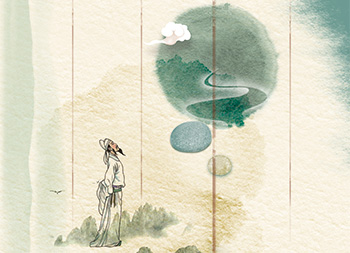 Li Bai
Li Bai
huā jiān yì hú jiǔ dú zhuó wú xiāng qīn
花 间 一 壶 酒,独 酌 无 相 亲。
From a pot of wine amid the flowers, I drink alone beneath the moonshine without a partner.
jǔ bēi yāo míng yuè duì yǐng chén sān rén
举 杯 邀 明 月,对 影 成 三 人。
Raising my cup, I invite the moon and turn to my shadow which makes us three.
yuè jì bù jiě yǐn yǐng tú suí wǒ shēn
月 既 不 解 饮, 影 徒 随 我 身。
The moon cannot understand my enjoyable drinking, and my shadow only follows silently wherever I go.
zàn bàn yuè jiǎng yǐng xíng lè xū jí chū
暂 伴 月 将 影, 行 乐 须 及 春。
The moment with the moon and shadow, I take the opportunity to have a joyous time until the end of spring.
wō gē yuè pái huái wǒ wǔ yǐng líng luàn
我 歌 月 徘 徊, 我 舞 影 零 乱。
I sing and the moonlight lingers, I dance and my shadow scattered.
xǐng shī tòng jiāo huān zuì hòu gè fēn sàn
醒 时 同 交 欢,醉 后 各 分 散。
Sharing cheer when I am awake, separating our ways when I am drunk
yǒng jié wú qíng yòu xiāng qī miǎo yún hàn
永 结 无 情 游, 相 期 邈 云 汉。
Make our friendships out of the secular world forever; meet next time in the sky together.
Good to know: Li Bai had political ambitions when he was young, and was a talented poet in the Tang Dynasty (618-907), but he didn’t want to start his political career after coming under imperial examination. He had tried to become a noble from being a commoner in one fell swoop. His friend recommended him to the emperor, but the emperor admired his poem, without paying attention to his political views. This poem was written in the frustration of seeing all his ambitions dashed, and presenting his grief and personal loneliness.
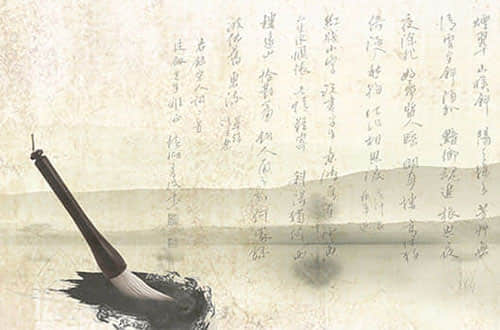 3 Chinese New Year Poems
3 Chinese New Year Poems  Qingming Festival Poems
Qingming Festival Poems 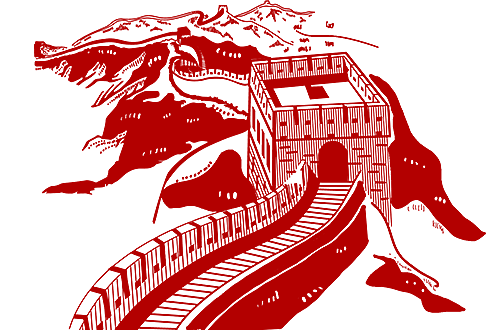 2 Poems about the Great Wall
2 Poems about the Great Wall  Chinese Poetry
Chinese Poetry